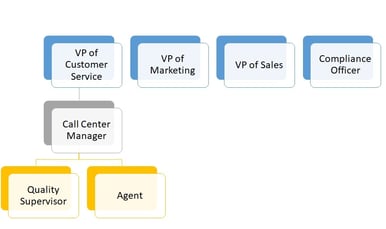By recording your conversations with customers, you are generating an invaluable piece of intellectual capital, which you can use to assess the customer experience, ensure PCI and HIPAA compliance, resolve disputes, verify orders and even uncover critical sales and marketing intelligence. In fact, call recording can add value to almost every area of your business.
Here are the seven primary roles within an organization that benefit from call recording. For each job title, this piece will highlight how it is used and the value derived. 
- Call Center Agent: Reviews a sampling of his/her own customer interactions (voice and screen) to assess his/her own customer service performance and potentially uncover workflow trouble spots. Also reviews best-practice calls from top-performing agents to learn how to better perform in various situations.
- Quality Supervisor: Reviews a sampling of calls per agent each month and fills out quality monitoring scorecards to rate various metrics, including first call resolution, proper greeting, resolution handling, politeness, up-selling, etc. The goal is to assess agents on skills and customer service performance, identify skills gaps and best practices, and assign training courses where necessary.
- VP of Customer Service: Listens to a few calls each week just to keep his/her finger on the pulse of how well the company services customers and to also experience the voice of the customer. Also plays select segments of best-practice calls during team meetings to highlight peak performers and motivate all staff.
- Call Center Manager: Receives and reviews daily customer service performance reports from the call recording system showing first call resolution, average handle time and other soft metrics like customer satisfaction, problem resolution, etc. With this insight, he/she can then direct quality supervisors to focus on specific skills areas and can also reward and/or incentivize supervisors and agents accordingly. The Manager also identifies and shares select, relevant calls with other departments.
- VP of Sales: He/she has the call center manager share specific interactions which provide meaningful sales intelligence, such as competitors' promotions. The VP of Sales also plays select calls at the start of each sales team meeting to motivate staff and enable salespersons to hear the actual voice of the customer. The call center manager also forwards periodic reports which detail the performance level of a new campaign or product/service to help guide future sales efforts.
- VP of Marketing: He/she has the call center manager share specific interactions which provide meaningful marketing intelligence, such as how well a new promotion or feature is doing. The VP of Marketing also plays select calls at the start of each marketing team meeting to allow marketing staff to hear the actual voice of the customer. The call center manager also forwards periodic reports which detail the performance level of a new campaign or feature to help guide future marketing efforts.
- Compliance Officer: When a compliance infraction arises, the call center manager forwards the specific recording, and the Compliance Officer listens to it (and reviews the agent screen activity) to better understand what went wrong. He/she also listens to occasional calls - also forwarded by the call center manager - to assess how well specific compliance practices are being embraced within the call center agent's workflow. He/she can then use this intelligence to train supervisors and agents accordingly on relevant compliance procedures.
There are certainly other roles within an organization which can benefit from listening to recorded customer calls, such as Product Marketing Managers, Produce Managers, Sales Trainers, etc.

